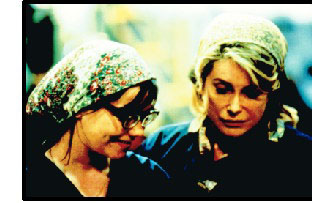
|

|

|

|

|
| |
|
|
|
Dancer in the Dark When an oppressively bleak movie holds its sway over a certain group--the youngish generation emerging from Dancer in the Dark with its cool largely wrecked in a hot flush--it becomes important to ask whether the film is striking a common chord or merely striking out. Is this the popular rebirth of some kind of Cannes-approved solidarity with unjustly doomed mothers working in metal factories? Have years of Madonna videos orbiting in heavy rotation finally made the globe safe again for the rogue musical? I think the appeal is something deeper and less-examined: a bliss-out in reverse. Call it
I've talked to people who wanted to resist this picture, a cynical riff on Hollywood fantasia that quickly plunges its overworked daydreamer into tragedy; the fact that they can't, or have even come to appreciate such a flogging, may be the ultimate triumph for Lars von Trier, who you might imagine on the set dressed in jodhpurs directing with a whip. He added that "von" to his name sometime between leaving home and enfant-terrible-ing his way out of film school, and it snugly suits the author of multiple manifestos on the state of his art--most publicly the Dogme 95 "Vow of Chastity," which basically rejected one kind of manipulative filmcraft for another. These days his chosen toys are melodrama, digital video and pop-electronica. If all this sounds cutting-edge, it's because it draws easy blood; von Trier goes for that old-time movie religion and scores with it, because it still stings after all these years. Let's all welcome the revival of misery cinema. To pull this off requires a miracle (or at least a leap of faith) and von Trier has one in Bjšrk, already famous for being the feistiest person from Iceland. A vocalist of almost distracting exuberance, Bjšrk is very "now" and her part preserves that, strategically: She's one hip Czech immigrant living in Washington State circa 1964, with her stretched-out sweater and zippy messenger bag. (Art students take note: This film is after you.) Those thick horn-rimmed glasses aren't just an affectation, however: Selma, her character, is going blind and, what's worse, she operates heavy machinery. This is the kind of conception that draws plenty of sympathetic "aws" as well as cringes--von Trier having his fun with shots of her careless hands lingering under hydraulic presses.
|


